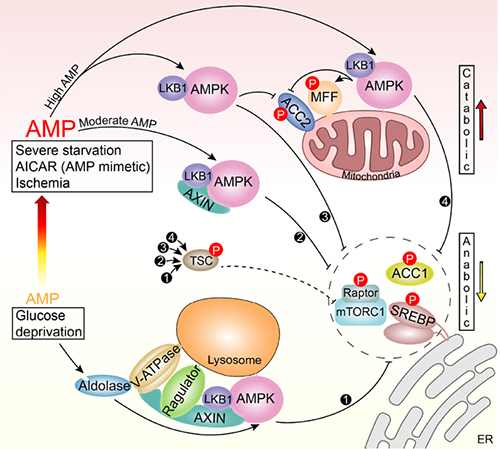
Recently, scientists from the Dalian Institute of Chemical Physics (DICP) of the Chinese Academy of Sciences, in collaboration with Prof. LIN Shengcai from Xiamen University and Prof. D. Grahame Hardie from the University of Dundee, discovered that hierarchical activation of AMPK depended on severity of nutrient or energy stress. Their findings were published in Cell Research.

A simplified model depicting that the differentially compartmentalized pools of AMPK are activated with different dependencies on AXIN, and the severities of nutrient or energy stress. (Image by WANG Wen and WANG Ting)
AMPK, a master regulator of metabolic homeostasis, is activated by both AMP-dependent and AMP-independent mechanisms. The conditions under which these different mechanisms operate, and their biological implications are unclear.
Depending on the degree of elevation of cellular AMP, the scientists found that distinct compartmentalized pools of AMPK were activated, phosphorylating different sets of targets.
Low glucose activated AMPK exclusively through the AMP-independent, AXIN-based pathway in lysosomes to phosphorylate targets such as ACC1 and SREBP1c, exerting early anti-anabolic and pro-catabolic roles.
Moderate increase in AMP expanded this to activate cytosolic AMPK also in an AXIN-dependent manner. In contrast, high concentrations of AMP, arising from severe nutrient stress, activated all pools of AMPK independently of AXIN.
These findings revealed a spatiotemporal basis for hierarchical activation of different pools of AMPK during differing degrees of stress severity.
This study was supported by the National Natural Science Foundation of China and the Open Research Fund of State KeyLaboratory of Cellular Stress Biology, Xiamen University.

86-10-68597521 (day)
86-10-68597289 (night)

52 Sanlihe Rd., Xicheng District,
Beijing, China (100864)

